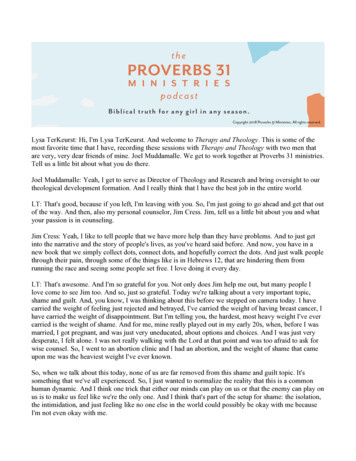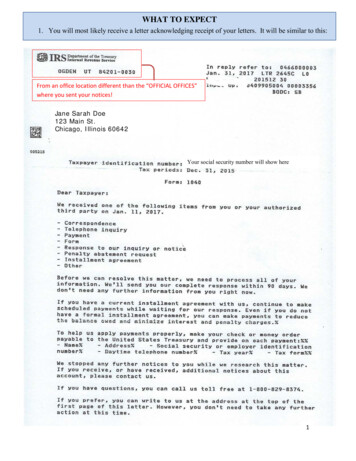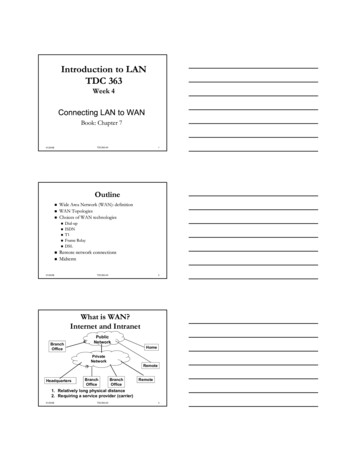
Transcription
Lysa TerKeurst: Hi, I'm Lysa TerKeurst. And welcome to Therapy and Theology. This is some of themost favorite time that I have, recording these sessions with Therapy and Theology with two men thatare very, very dear friends of mine. Joel Muddamalle. We get to work together at Proverbs 31 ministries.Tell us a little bit about what you do there.Joel Muddamalle: Yeah, I get to serve as Director of Theology and Research and bring oversight to ourtheological development formation. And I really think that I have the best job in the entire world.LT: That's good, because if you left, I'm leaving with you. So, I'm just going to go ahead and get that outof the way. And then, also my personal counselor, Jim Cress. Jim, tell us a little bit about you and whatyour passion is in counseling.Jim Cress: Yeah, I like to tell people that we have more help than they have problems. And to just getinto the narrative and the story of people's lives, as you've heard said before. And now, you have in anew book that we simply collect dots, connect dots, and hopefully correct the dots. And just walk peoplethrough their pain, through some of the things like is in Hebrews 12, that are hindering them fromrunning the race and seeing some people set free. I love doing it every day.LT: That's awesome. And I'm so grateful for you. Not only does Jim help me out, but many people Ilove come to see Jim too. And so, just so grateful. Today we're talking about a very important topic,shame and guilt. And, you know, I was thinking about this before we stepped on camera today. I havecarried the weight of feeling just rejected and betrayed, I've carried the weight of having breast cancer, Ihave carried the weight of disappointment. But I'm telling you, the hardest, most heavy weight I've evercarried is the weight of shame. And for me, mine really played out in my early 20s, when, before I wasmarried, I got pregnant, and was just very uneducated, about options and choices. And I was just verydesperate, I felt alone. I was not really walking with the Lord at that point and was too afraid to ask forwise counsel. So, I went to an abortion clinic and I had an abortion, and the weight of shame that cameupon me was the heaviest weight I've ever known.So, when we talk about this today, none of us are far removed from this shame and guilt topic. It'ssomething that we've all experienced. So, I just wanted to normalize the reality that this is a commonhuman dynamic. And I think one trick that either our minds can play on us or that the enemy can play onus is to make us feel like we're the only one. And I think that's part of the setup for shame: the isolation,the intimidation, and just feeling like no one else in the world could possibly be okay with me becauseI'm not even okay with me.
So, let's start off, first let's define shame. And then let's talk about how does it play out. How do werecognize some of those thoughts or some of the reactions that we're having in life where, okay, this isshame, because we're also talking about guilt, and shame and guilt are not one in the same? So, what doyou think, Jim?JC: Well, I say and, you've heard me say this, that shame I say stands for “S.H.A.M.E. Self-Hatred atMy Expense”. It's always about condemnation, literally condemning myself. And there's a message,which we're going to get into another episode of shame scripts. But there's a message that something isclearly defective in me. Something is wrong as we get to guilt. It has been said, well, the guilt is, youknow, I've done something wrong. There's healthy guilt, which we'll get into later. But shame is “I amsomeone wrong.”LT: Okay. Say the acronym one more time because I love to take notes during the podcast and I justneed a refresher.JC: I just say that shame - S.H.A.M.E - stands for self-hatred. I hate myself. There's the condemnation,“Self-Hatred at My Expense”, because it cost me. It cost me of myself. It costs me and my relationshipwith others. And it will cost me certainly in my relationship with God. Romans 8:1 tells us “there istherefore now no shame,”- if you will- “no condemnation for those who are in Christ Jesus” andexperientially if I'm in shame, walking in shame, not that I've lost my salvation - don't worry to ourresident theologian - but experienced there functionally that I've kind of stepped outside of Christ Jesusfor a moment. It's like I'm not walking with Him, because walking with Him there is no condemnation.So, self-hatred, I hate myself and it costs me a lot at my expense, cost me a lot quite frankly.JM: So good.LT: Yeah. I've often said, I think I talked about this in my book, Uninvited, which is primarily a bookabout rejection, when you feel left out, less than and lonely, and something that I became aware of isthat a lot of times something will happen to me or I will make a choice. And from that, I develop a linethat I say inside of my head. And that line, eventually if unattended to, turns into a label that I put onmyself. So, you were saying, shame isn't just that we've done something wrong, but it's us determiningwe are something wrong. So, then the line that either someone else spoke over me, or I have thisperception and I've spoken it over myself, that line turns into a label then that label very quickly turnsinto a lie that I believe. And I find myself really turning more to the lie rather than turning to the truth.And I want God's Words to be the words that become the story of my life. Not this lie that I believebecause of a line that was spoken over me that I labeled myself with. So, the line turns into a label turnsinto a lie. And that lie then turns into a liability.JC and JM: Totally. Yeah.LT: And so, I think this is kind of the way for me that it starts to play out. And when I say a liability, itturns into a liability, not just of holding things that hold me back, but also liability in my relationships,and liability even in my relationship with God. So okay, so we know now the difference between shameand guilt. But how does it play out for you, Joel? Like what starts to happen that you're able to identifythat’s shame?
JM: Yeah, I think where the big thing that happens for me is when I begin to think about my ownimmediate consequences, like when I think about shame, and then I, to Jim's point, I get to self-hatred. Iget to self-condemnation, I begin to listen to my own brain in my own echo chamber, of all the thingsthat I have done wrong. And I begin to tell these stories about myself and almost it turns into an overexaggeration of myself, not in the way that God sees me but I would say in the way that the enemy seesme and in the way that is, exalted by our fallen nature.So, what's really interesting is that I think both of you have said four words. And there's a fifth kind ofidea. So, we've talked about guilt. We've talked about shame. We've talked about conviction. And we'vetalked about condemnation. And theologically, like once we introduce the theology concept here, Iwould just suggest that guilt and conviction are actually, really two godly, theologically appropriateresponses. Genesis 1 and 2 tell us that you and I were created in the likeness and image of God. So, Iwant to go to identity here. What does it mean that we were created in the likeness and image of God?In the ancient Near East, so, this is like Mesopotamia, and the Canaanites and on all those ancientpeople, —LT: And hold on, because, you know, Joel is about to get in his field right here, y'all. He is really, Imean, this is, this is why I like to work with Joel because I'm like, No, I haven't actually thought ofMesopotamia in a while, but let's go there, because I know it's going to lead me somewhere good. So,don't tune out right here, I want you to really get this because it's going to be good.JM: Because we read a phrase like “likeness of an image”, and we just bypass it so quickly, right? Butit's rooted in a historical context. And the context is that when those words are being used at that timearound those people, it was actually a reflection of a king and his children. So, you would depict thelikeness or the image of royalty with their children, and you would use those exact same words andphrases.So, when Moses, who I think is writing Genesis says that Adam and Eve were created in the likenessand in the image of God, this is an identification of our sonship, of our daughtership, of the fact that weare made in the likeness and the image of the Royal King of heaven and earth. And so, this means theway that we think of ourselves should be through the lens of this theological truth, not what the enemywants to step in and kind of bypass, and so, this is just another really quick thought. If we, guilt is a goodthing in the sense that it lets us know that this is not how it ought to be.JC: Yeah.JM: Right. Guilt left unattended, and you used that word Lysa, guilt left unattended turns to shame. Andit's the shame, it's in that sweet little spot between guilt and shame I think the enemy loves to play thesame thing with conviction, condemnation. Conviction is a good, good thing. It reminds us that we havean area that we have to reorient ourselves to with God. However, if we don't act in response to theconviction, that little spot is where the enemy steps in, and that turns into condemnation. Convictionand guilt are meant to cause our hearts to turn back to Yahweh, turn back to God. But guilt, but shameand condemnation are tools used by the enemy to cause us to run away.
LT: Hmm, that is so good, Joel. And we were talking earlier too about you saying that it, it was not justwhat the feeling was in the moment, but it's where it's leading us too ultimately, right. And so, I thinkthis is really important, when we have a thought, that we need to play that out a little bit and ask, like,where does this lead? If this is leading me, because conviction if unattended to when, when we're, it'salmost like the Holy Spirit is kind of prompting us like, this is not what you need to be saying. This isnot what you need to be doing, or don't participate in this activity, or don't turn to this as a copingmechanism or whatever, but that conviction is leading us to repentance, or even to prevention of sin.Like it's saying don't do this because if you do this it's going to cause you to get into this sin, or it's goingto cause you to feel in a way that is not in keeping with who you really are.But that condemnation, if it gets to that place where we're just feeling ultimately condemned, that's alsogoing to lead us somewhere, and that condemnation will lead us into shame. And shame - Jim, I wantyou to comment on this - shame is going to lead us into something to cover up that shame. Because thething about shame is, it is of the darkness and when kept in the darkness, it leads us further and furtherand further away from God's very best. So, it's almost like shame is a driving force to get legitimateneeds met in an illegitimate way. And there is a plethora, I mean just a plethora of addictions anddistractions and sin cycles that, that people can get into when this happens, right?JC: It's so true. And to go back, which we've done on these podcasts before, to go back to Genesis 3.You're in Genesis 2, they're naked and unashamed. Genesis 3, all of a sudden, their eyes are open. AhOh, and they go from naked and unashamed to naked and ashamed. It’s so interesting. The way I see itis then in that narrative with Adam and Eve, they grab fig leaves to cover their inadequacies. What wasso beautiful and precious before, is like now so shameful and so scary. Then they jump over in bushes tohide from, interesting, from themselves. Like you can hide from yourself. People try to. They'lldisconnect from themselves; shame is always about disconnection. It is always about disconnection.Interestingly, that healthy guilt will lead us to connection if we follow the path, like to Psalm 51, abroken and contrite heart God won't despise. And so, they're over there hiding from themselves. Hidingfrom yourself, hiding from each other, and then hiding from God. So, what we want in life isconnection. We're wired for it. And what we do in shame is we literally disconnect. Once I candisconnect, the nature abhors a vacuum. We were literally born, you know, in utero, we're connectedwith an umbilical cord to mom so nobody is going to stay disconnected. They will reach out and it reallydoesn't matter. They will reach out for something.Addictions are usually shame driven, and yes, trauma driven, but out of trauma those messages can beI'm a loser; I'm unwanted. Those are shame messages. So, I will reach out for something in shame, butusually not something good. And that guilt part is so interesting that both the Bible would teach, Ibelieve, and if you want to call it secular psychology would teach, we need healthy guilt because if wedon't see everybody has a personal value system. Everybody has a value system. Guilt is that whisperin your ear. Maybe someone's yelling in your ear saying “this is incongruent with what you say youbelieve in, certainly in the Word of God. This is incongruent with what your values are as a Christian.”So, guilt is a friend saying, stop, don't go down that path. Shame will say, actually do go down this path.And then the last thing I want to say is if you try to fight shame with shame, it's one of the mostcommon things people will do. They're in shame, and they fight shame with shame, shame themselvesmore or watch somebody outside basically tries to shame them as someone's in their own shame. And
then you speak even words of condemnation over them. I see that all the time, which is either why youare doing it or the other person trying to fight shame, with shame, that will spin you down that vortex ofshame, darkness really quickly.JM: And I think Jim, what you're saying, and Lysa, what you've said, there's this underlying current orthread, which is the difference between isolation, individualization and darkness versus biblically, thepeople of God, the family of God, the presence of the Spirit of God, to unite us together to be able todeal with these issues. And so, I do think one of the tragedies of part of our cultural context and situationis that we have felt more alone than we've ever felt before. But we have more opportunity to quote,unquote, connect to each other, you know, and so I just think that's really interesting that one path, thispath of shame, and condemnation will lead you to self-isolation and self-hatred.JC: And disconnection.JM: And disconnection.JC: Yeah, that we're wired for connection and that isolation piece that we started off, I think we startedoff this podcast with, when we talk about any level of disconnection and isolation, here's the practical,yet deadly part: If I can get isolated and disconnected over here, everything's possible. People say, howcould you do this? Which is not a wise thing to say, by the way. What were you thinking in shame?They're in that limbic brain that we've talked about here before. They're not thinking, this prefrontalcortex, prefrontal cortex is offline. So, they're there. And it's like, what were you thinking? Not a reallygood question. They're not thinking. And once I go down, I say that shame is the runway for addiction totake off on. So, when you're in shame, all things are possible. How could you do that? I'm in shame, I'mdisconnected. I can do anything.LT: And the limbic part of the brain is that fight, flight, freeze, freak out.JC: Yes.LT: And you've even said fornicate.JC: Or forage. People, all this eating stuff is very primal, if you will, a very limbic brain, because it'sabout I feel like I'm dying. And therefore, I am going to do something fight, flight freeze, freak out,fornicate. A lot of sexual activity is that way. And here's the thing, the worst of the three major F's fight,flight, or freeze is freeze. Shame is notorious for getting someone to freeze because at least in fight orflight, you’ve got some movement going, but you get in that and you literally will get paralyzed inshame. It just seems as layer after layer, and you can go down a rabbit hole, so deep in shame that it canfeel like it's quite hard to come out of.LT: So, speaking of that, how do we come out of it? Or how do we help someone who we know isalready down in that vortex of shame. Because this is really the root of addictions, it's at the root ofnarcissism. A lot of people think that the root of narcissism is pride, it's really a cover up for some deep,deep shame that is there. And that, you know, it's not just narcissistic personality disorder, but it'snarcissistic tendencies, which we all have - that at the root of it, it's some kind of cover up for shame.
So, addictions and narcissism and, you know, we were talking earlier, even like, binging on Netflix, orovereating.JC: Which is its own connection. Right? You will say, well, you said, you'll always reach out for aconnection, even in shame. That's a connection, that I can binge watch however much and it'll even theirnotice, we're watching those shows. I'm not against Netflix, but the body and brain and soul, I believethere is going to feel like, yeah, I know those people, that sitcom, or in that drama, or in that movie.Those are all stories and narratives. We're wired for story. So, it will feel like I'm connected in kind ofan alternative world, but it's still about connection.LT: Right? And the same thing with pornography. You know, and it's kind of like I know, sometimeswhen people do not struggle with pornography, they look at pornography and they just don't get it. But ifyou understand that, looking through the lens of shame, it is a way to connect with no emotionalresponsibility.JM: Yeah.JC: And I love that we're going to do our podcast coming up on emotional maturity, immaturity. Andyou look at that dynamically on just the pornography issue. It doesn't require the person viewing it toshow up. The Trinity invented sex, not man. God, Father, Son, Holy Spirit, invented sexuality forbonding, attachment, oneness. And so, when someone is there viewing pornography, it will feel like thatthere is a connection. Virtually they feel like they actually are being sexual. And then the problem is atthe end of that, in sex between a man and a woman, there would be oxytocin.Everybody knows mothers with babies and bonding, the bonding chemical, guys, all those neurochemicals plummet at the end of sexuality. And when they plummet, the only one God left there that weknow of is oxytocin to bond. Well, when you are by yourself and watching that, the end of that's whydespair is always at the end of an acting out sexual cycle. You're left to bond with nothingness, nothing.You can't bond with yourself. So therefore, you've reached out for connection in the end, extremelyfeeling like I am so utterly alone.LT: So, I want to get to what is the solution? Because I would imagine that biblically, andpsychologically, there are solutions. So, I want to get to those. But as to the connection, let me just reada verse because I think that this is very telling. It's one that we were talking about Jim, from Jeremiahchapter 2. I want to go before verse 13. I want to go to Jeremiah 2, halfway through verse 11 and it says,“ but my people have exchanged their glorious God for worthless idols.”So, they've exchanged the connection with a God that satisfies; a God that gives peace; a God that givesjust joy; and they've traded that for worthless idols that in the end, are no connection at all. And thenlet's keep going down to verse 13. “My people have committed two sins, they have forsaken me thespring of living water, and have dug their own cisterns, broken cisterns that cannot hold water.” AndI've been in Israel before and actually put my eyes on a cistern and it is muddy. It is sometimesstagnant. And it is no substitute at all for a spring that you could literally hold your water bottle up toand with confidence know that this is living water. This is water that's going to be good. And you stickyour water bottle down in a broken cistern, I mean, you could very well pull up mud. Yes, there's anelement of water to it, but it's not going to be satisfaction.
JC: Think about which we've talked about before. It's not, think about it, you know, this, the dilemmaand having worked with many people with addictions, the thing that the broken cistern does do: It is ondemand God. I've said G.O.D. does not stand for God on Demand. So, He is living water, He providesthe living water, it's everything. But that lack of trust, the sense that, you won't be there God. And I'vewatched. In one point for a year after college, I lived at the Salvation Army with alcoholics and drugaddicts, and the stuff they would try to drink, the unbelievable ways they tried to get alcohol, but theyknew it was on demand. So, the broken cistern is deadly. It's terrible. But it's on demand. And somepeople would say I would rather have this, and yes, its muddy water, but I can get it whenever I want.You've seen people, we've all seen people, destroy their lives with addictions. Because I know if I drinkthe bottle, if I take the drugs, if I act out with porn, it is here instantly. It is here now. In the moment, itfeels like a connection – watch – to the broken cistern. But in the end, as the Word of God says, I've saidbefore, Deuteronomy 30 “life and death, blessing and cursing, I say that you choose life.” It feels likelife in the moment because it'll numb out even a broken cistern, but always delivers death, just in thatmoment.LT: I've said before, so my issue isn't so much drugs and alcohol and all of that, but more like frenchfries. You know? So, I've said before, it's much easier sometimes to figure out how to drive through afast-food restaurant and get french fries that will give me a temporary sense of fullness–JC: Usually in less than five minutes because they're running the clock in the drive thru. You better getthem through.LT: Yes. And so sometimes it's easier to get that instant satisfaction of french fries than it is to open upmy Bible and get that hit of instant satisfaction. So, you know, I just, I think no matter where you're at,humanity does this. It is not just the children of Israel; it is a human condition. So, we've establishedwhat it does to us, this shame and condemnation, the difference between guilt which can lead torepentance and conviction which can, you know, prompt us to not do something as opposed tocondemnation, which keeps us away from God and stuck in possibly a sin cycle? So, we've talked aboutall that.But what do we do? Okay? We recognize sin in us, or shame in us. And we recognize maybesomebody's stuck in a cycle of shame that we love very much. Jim, you've mentioned a couple things.Don't say, what were you thinking? I think that's a really good, helpful, practical tip. But what do we do?And I'd love to hear both from Joel and Jim on this. What do we do when shame is very present?JM: Yeah, I would say let's listen to what Paul says, and this might be helpful. Ephesians 4. And I thinkit's important to understand what's happening in the city of Ephesus. The Temple of Artemis is there. It'sone of the wonders of the world. This is a place when we talk about all these things. I mean, debaucheryand fornication and drug addiction. I mean, this was rampant in the Temple of Artemis.JC: There’s nothing new under the sun, right?JM: There is nothing new underneath the sun. We've been turning to the same vices for ages since thebeginning and yet there's a virtue that God has given us that we should seek after. And this is how Paul
describes it, and what Paul is doing is really summarizing what we've been talking about, this idea that and we're going to talk about it more later - there is an old self that is associated with a dark way ofliving, that is bent on self-glorification, which is ultimately self-hatred. I'm curious what you think aboutthat.JC: I totally agree. That’s right where it ends. Yeah.JM: But that's kind of what I think like, we think we're glorifying ourselves. But actually, it's an act ofhatred of self-hatred. And so, it's so intriguing, but this is what Paul says, and he starts in verse 22. Whatchapter? Ephesians chapter 4. I would definitely suggest you read verses 17 through 22. He talks aboutthe futility of our minds. “We were once darkened, and our understanding were alienated from the lifeof God.” So that is our past sense. But then in verse 22, he says this, “to put off your old self, whichbelongs to your former manner of life, and is corrupt through what deceitful desires, and to berenewed.” So, we were once corrupt, but “to be renewed in the spirit of your minds and to put on thenew self, created after what the likeness of God in true righteousness, and holiness.” And I think this isthe very practical and unexpected. How do we do this? “Therefore, having put away falsehood, let eachone of you speak the truth with his neighbor, for we are members one of another.”And so, I do really believe what Paul is getting at here is, in a sense, what do we do, we do what we'vejust done, we have to identify the falsehoods, we've got to name them for what they are, we've got to seethem for what they are. One of the things I've learned, Jim from you, and from Lysa is actually tangibly,sometimes writing these things out so you can visibly see them. But I also see this other great principlethat Paul is getting at. And the principle is we were not meant to do this alone. To be a part of thefamily of God is to be surrounded with brothers and sisters that can speak the Truth of the gospel intoyour life.What is the Truth of the gospel? That you are not your worst moment. Right? You are not your bestmoment. You are a reflection of Christ on the cross and His victory over sin and death. And so, just verytangibly, being in relationship. And so, I would just say and suggest if you find yourself isolated fromthe family of God, that is one indication, one tangible step to fight aggressively to be connected to thefamily of God. And that typically happens within the local church.LT: And Joel, it's not just about going to church, although that is important. But if we go and we're justsitting on the last row or, you know, in that last section of seats, and we're not ever connectingpersonally with people, then we're kind of missing what's so important here. And that is connection.And, Jim, you've taught me this, it's really about intimacy. And it's having someone close enough or agroup of people close enough where you feel safe enough to have into me you see intimacy. And, youknow, it's not that we want to be completely naked with someone, but it's that we want to have anopportunity with people to see the stripped-down version of us; the part of us without the performance,without the pretense, without all the accolades, and without all the props. You know, it's just thestripped-down version of me emotionally, and maybe spiritually, that you allow them to see. Naked wecame into this world. Naked will go out of this world. But vulnerability, even though we wear clothes,but vulnerability is what really provides intimacy. So, Joel, what you're saying is having thoseconnections, biblically, is part of how we can get out of isolation. Which isolation, it seems like, is kindof feeding into the shame and continuing the cycle of shame.
JM: And I would just say very practically too, when you have that level of connectivity and intimacy,we've been working together long enough, where we could say, hey, I kind of understand that you havethis doubt, and you're beginning to work down this spiral. And that's the intersection that we have,responsibilities as brothers and sisters in Christ, to be able to speak truth in love in those moments. In away that if I am isolated, I'm not going to be able to see those on my own. I'm just going to keep goingdown that black hole. And so yeah.LT: And sometimes, I think shame sneaks out in snarky comments people make about themselves andothers, you know. And so, sometimes, I think if you're in a safe, more intimate friendship withsomeone, you can have the opportunity to just say, stop that thought. Yeah, like, take that thought, or I'llsee them. Or I can even find myself being resistant to take a compliment, because it's almost like mesaying, if you really knew me, you would never say something so nice. So sometimes when I see peopleresisting a compliment that I give them, I'll say, no, I want you to take that compliment. I want you toput it right here on your chest, I want you to rub it in and let it sink in. Because it's truth. And theresistance that you're feeling right now is because the truth I'm speaking over you is bumping into a liethat you're carrying inside, and you need to make room for the truth by uninviting the lie from inside ofyou. So, Jim I would love just any counseling, wisdom or wisdom that comes from your counselingbrilliance. So, if I'm sitting in front of you today on your famous couch, and I am struggling with shame,what are you telling me? Like what is what is the thing that I need to remember or shift in my thinking?JC: I'm going to start with what I call the hub of communication. It's the hub of connection, I hear you.And people can hear this and think, well, that's just cheesy or trite. No, it's not. It's simple. The Hub is Ihear you, you as I understand you, or I'm trying to understand you, and be as I believe you. And often I'llsay to people very simply, that makes sense. Of course, that makes sense. So, I want to connect thatway. The person understands that I'm trying to be safe.If you share, according to researcher, Dr. Brené Brown, and we know this experientially, if you shareyour shame story, your trauma story, your abuse story with someone who's not safe, it literally will justexplode inside you and make it where safety is crucial. That's to a degree why a lot of counseling existsto go in. It'
Apr 06, 2021 · Lysa TerKeurst: Hi, I'm Lysa TerKeurst. And welcome to Therapy and Theology. This is some of the most favorite time that I have, recording these sessions with Therapy and Theology with two men that are very, very dear friends of mine. Joel Muddamalle. We get to work together at Proverbs 31











